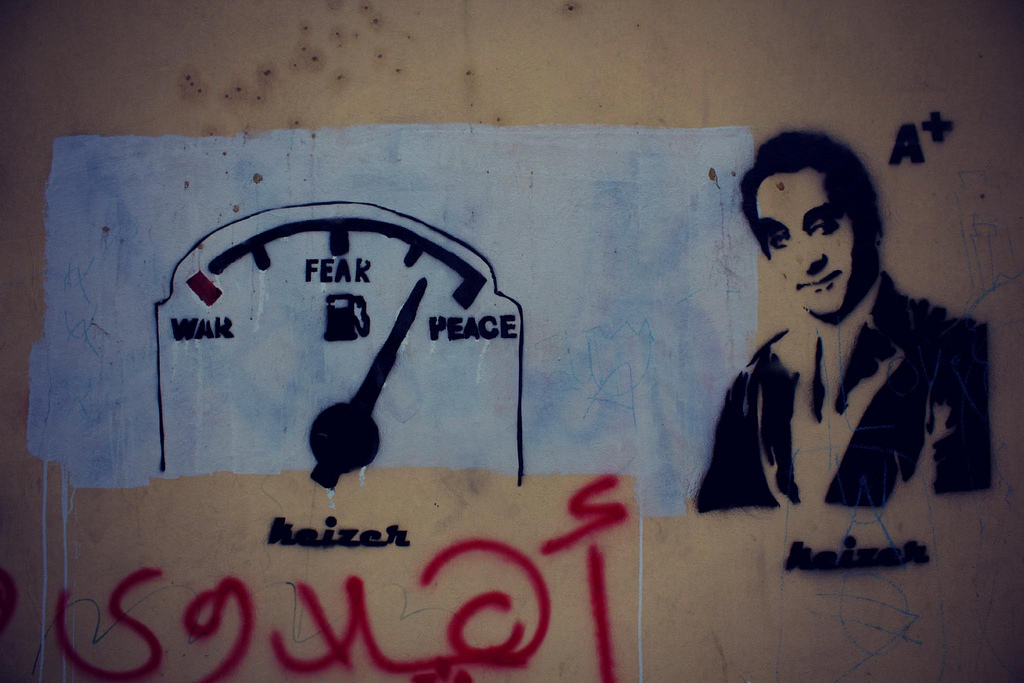
Freedom of speech in Egypt may have just taken a devastating hit. On June 2, 2014, Egyptian political comedian Dr. Bassem Youssef announced the cancellation of his wildly popular political satire show, Al-Barnameg (“The Program” in Arabic), suggesting that he no longer felt safe criticizing Egyptian politics and government.
Dr. Youssef was a cardio surgeon who gave up his lucrative career to film YouTube videos from his laundry room, satirizing the turbulent Egyptian political climate during the fall of Hosni Mubarak during the Arab Spring of 2011. Dr. Youssef’s homemade satire show became so popular that, in only its first three months, it accumulated millions of views on his YouTube channel. Eventually, when the political climate “stabilized,” Dr. Youssef was offered his own TV show with a live audience – the first and only of its kind in Egypt – on the Egyptian network CBC. Al-Barnameg has most recently broadcast from MBC Misr, another major Egyptian television network.
Dr. Youssef’s charisma and original approach to explaining and analyzing Egyptian politics, which has earned him the nickname “the Jon Stewart of Egypt,” was so well received by the Egyptian public after decades of political oppression that he has since become a national hero (click here to see Dr. Youssef’s interview with Jon Stewart in 2013). He has millions of fans all over the world and was also named as one of Time Magazine’s 100 Most Influential Men of 2013.
But on the next day, June 3, Youssef’s announcement was seemingly forgotten. Al Barnameg’s cancellation was overshadowed by the published results of the Egyptian presidential election, in which former Egyptian Defense Minister Abdel Fattah al-Sisi won with a controversial 96% of the vote.
The election was called in the last month, a little less than a year after the coup that ousted democratically elected Mohammed Morsi and discredited and banned the Muslim Brotherhood political party and religious group. The last few years of political turmoil in Egypt have made every one of the numerous elections a hotbed of both hope and controversy. The month leading up to this election was no different. Vast numbers of Egyptian political groups refused to vote, despite government incentives. Al-Sisi’s only opponent, Hamdeen Sabehy, received a dubious 3.9% of the vote, which begs the question if the election was conducted properly. Sabehy himself claimed that his campaign representatives were attacked during the three-day elections, and he questioned the credibility of the results. Even the White House announced in a statement that, while it supported al-Sisi in his win, it had “concerns about the restrictive political environment in which the election took place.” And yet, al-Sisi has still become the official new President of Egypt.

Dr. Youssef and Al-Barnameg represented an expression of this “right,” whose existence has been debatable in Egypt throughout the last few years of political turbulence. He has criticized the Egyptian government through the rise and fall of two coups and constant political instability. He has retained the loyalty of his millions of fans from all over the world and the (perhaps sometimes shaky) support of Egyptian news networks. People began to refer to Al-Barnameg as “the barometer of free speech in Egypt” because Dr. Youssef’s ability to broadcast his opinions on national television was proof that Egypt was advancing on the path to democracy. It was proof that the government, regardless of its recent instability, was allowing the networks to broadcast political criticism.
It makes sense that the recent election results and the controversy surrounding them might overshadow the cancellation of a popular satire show. But the timing of and reasons for Al-Barnameg’s cancellation should have raised some red flags. Back in May, when the upcoming presidential election was declared, the show announced a month-long “vacation.” This hiatus was allegedly put in place to keep the Egyptian public from being influenced by the program’s critical views until the election was over. But no one knew who exactly had called for this hiatus, and no one seemed concerned that an unknown entity had temporarily silenced Dr. Youssef’s political commentary during this election. These were the first signs that something was wrong. And then, instead of coming back from the hiatus after the election as everyone expected, Al-Barnameg was simply cancelled.
Given Dr. Youssef’s history, it should also have come as quite a shock to both the Egyptian public and the world that he decided to cancel his program due to safety reasons. He has never seemed to worry about his safety in the past, as he has bravely continued to broadcast his satire shows no matter the political climate. He has embraced his role as the voice of the people in the name of their rights. Even when the government arrested him in 2013, he mocked the legitimacy of the arrest and was eventually set free. Why is he suddenly concerned for his safety when he has mocked it in the past? There is no actual proof that Dr. Youssef has been threatened by anyone, but I am of the opinion that the same shadowy figure that forced Al-Barnameg into hiatus is also pressuring Dr. Youssef to finally quiet what has been an exceptionally strong voice for the people.
The cancellation of Al-Barnameg cannot be left to fall by the wayside. The timing of the cancellation and Dr. Youssef’s declaration of fear for his safety cannot be forgotten and overshadowed by al-Sisi’s controversial election. Dr. Youssef’s precedent for measuring the freedom of speech and his conviction that the people have a right to criticize a government are too important to be marginalized by whatever secretive forces are at work in the sunrise of al-Sisi’s administration. It would be a shame if Egypt’s recent progress towards granting basic rights to its people – basic rights such as freedom of speech and freedom of the press – regressed because of new governmental leadership.
The views expressed by the author do not necessarily reflect those of the Glimpse from the Globe staff and editorial board.







